2106AFE Company Law: Share Cancellation and Corporations Act
VerifiedAdded on 2022/10/11
|6
|1177
|13
Homework Assignment
AI Summary
This document presents a comprehensive analysis of a company law scenario, focusing on the proposed share cancellation within Digital Optometry Pty Ltd (DO). The assignment examines whether the proposed cancellation complies with the Corporations Act 2001, considering issues of selective reduction, capital reduction, and the potential for jeopardizing the company's fiscal ability to meet its obligations. The analysis involves the application of relevant sections of the Corporations Act, including sections 254Y, 256, 258, and 588G, along with referencing the case of Winpar Holdings Limited vs. Goldfields Kalgoorlie Limited. The solution outlines the steps required for canceling shares according to Section 254Y and concludes that the proposed share cancellation would not comply with the Act. The document also includes a bibliography of case laws, legislations, and articles to support the analysis.
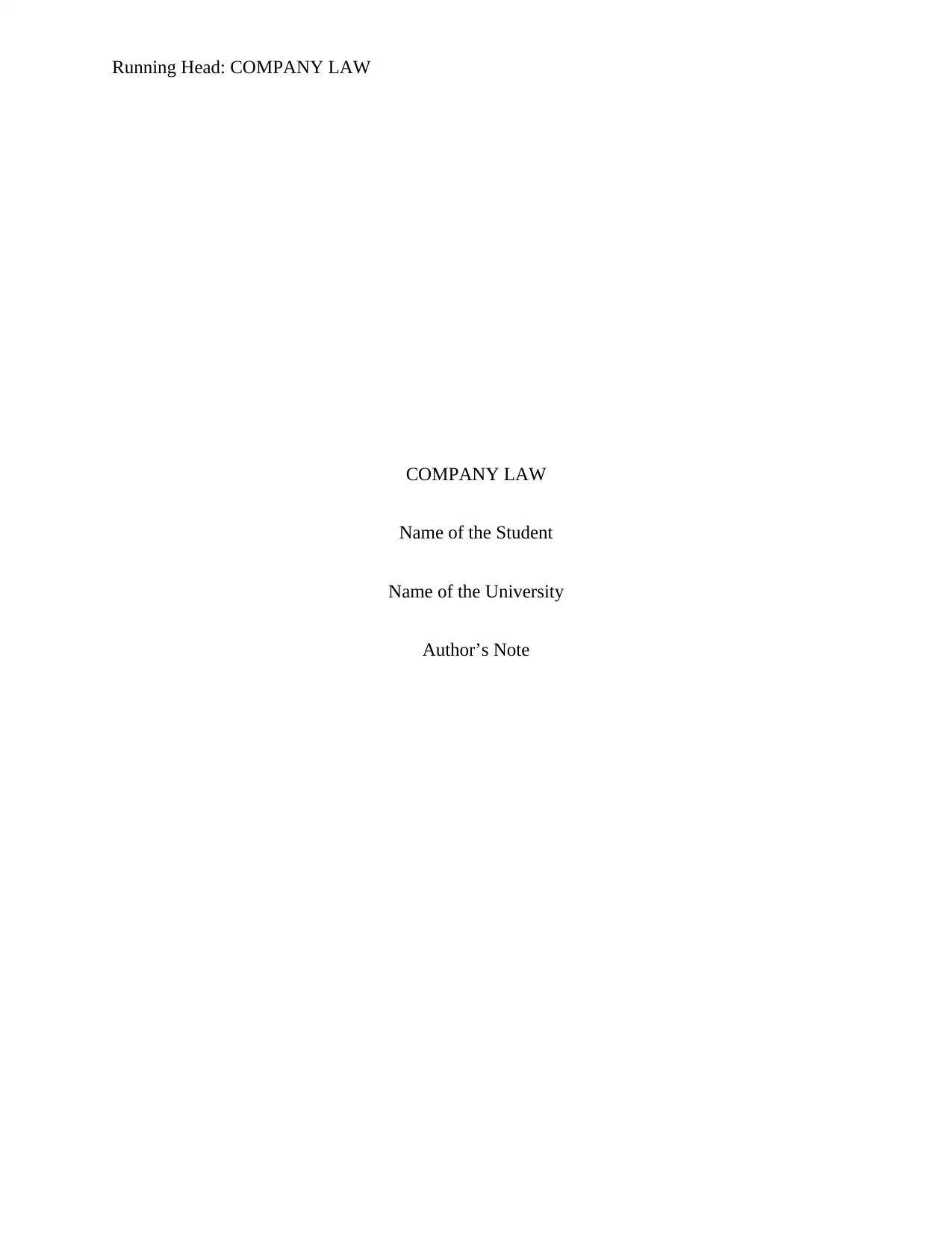
Running Head: COMPANY LAW
COMPANY LAW
Name of the Student
Name of the University
Author’s Note
COMPANY LAW
Name of the Student
Name of the University
Author’s Note
Paraphrase This Document
Need a fresh take? Get an instant paraphrase of this document with our AI Paraphraser
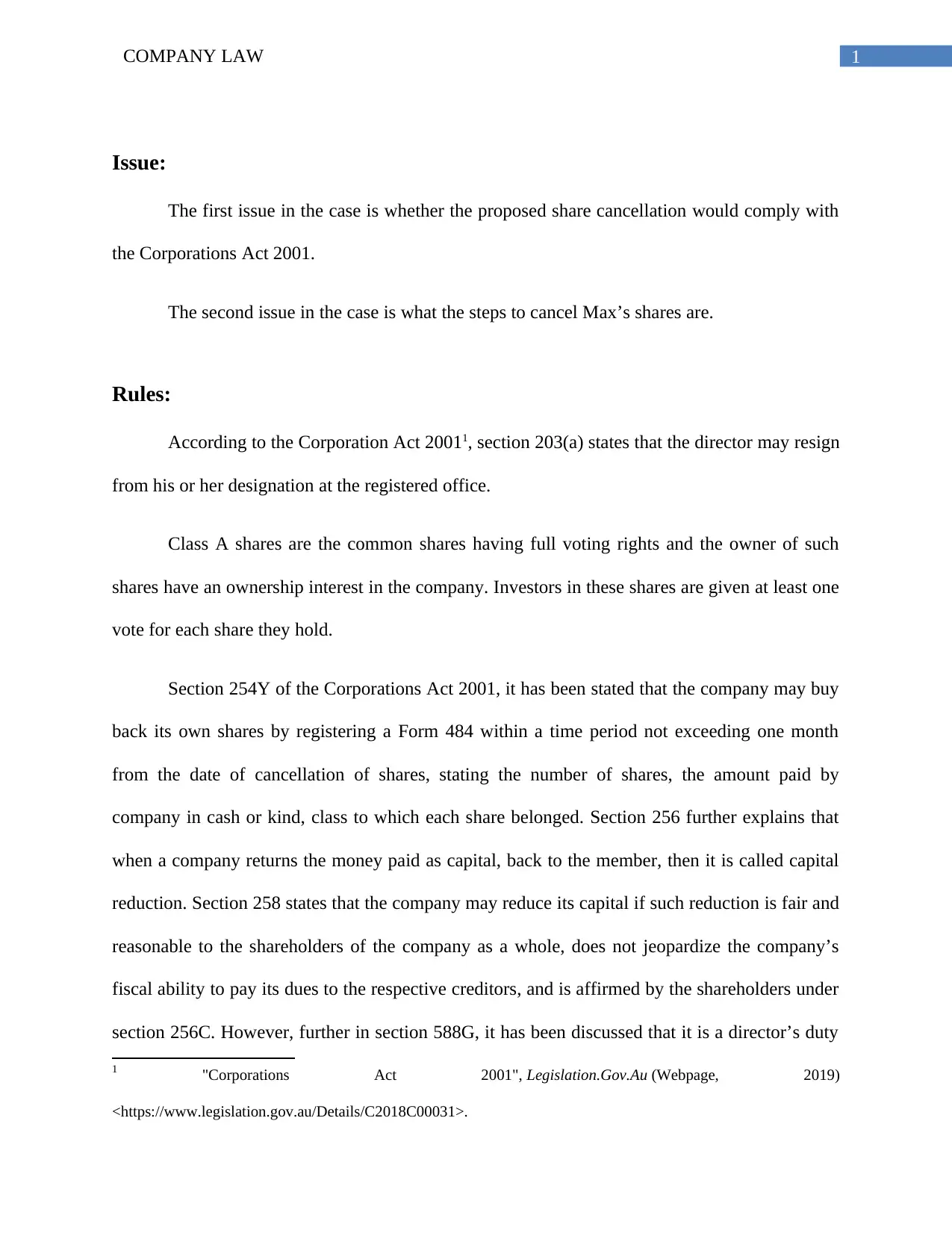
1COMPANY LAW
Issue:
The first issue in the case is whether the proposed share cancellation would comply with
the Corporations Act 2001.
The second issue in the case is what the steps to cancel Max’s shares are.
Rules:
According to the Corporation Act 20011, section 203(a) states that the director may resign
from his or her designation at the registered office.
Class A shares are the common shares having full voting rights and the owner of such
shares have an ownership interest in the company. Investors in these shares are given at least one
vote for each share they hold.
Section 254Y of the Corporations Act 2001, it has been stated that the company may buy
back its own shares by registering a Form 484 within a time period not exceeding one month
from the date of cancellation of shares, stating the number of shares, the amount paid by
company in cash or kind, class to which each share belonged. Section 256 further explains that
when a company returns the money paid as capital, back to the member, then it is called capital
reduction. Section 258 states that the company may reduce its capital if such reduction is fair and
reasonable to the shareholders of the company as a whole, does not jeopardize the company’s
fiscal ability to pay its dues to the respective creditors, and is affirmed by the shareholders under
section 256C. However, further in section 588G, it has been discussed that it is a director’s duty
1 "Corporations Act 2001", Legislation.Gov.Au (Webpage, 2019)
<https://www.legislation.gov.au/Details/C2018C00031>.
Issue:
The first issue in the case is whether the proposed share cancellation would comply with
the Corporations Act 2001.
The second issue in the case is what the steps to cancel Max’s shares are.
Rules:
According to the Corporation Act 20011, section 203(a) states that the director may resign
from his or her designation at the registered office.
Class A shares are the common shares having full voting rights and the owner of such
shares have an ownership interest in the company. Investors in these shares are given at least one
vote for each share they hold.
Section 254Y of the Corporations Act 2001, it has been stated that the company may buy
back its own shares by registering a Form 484 within a time period not exceeding one month
from the date of cancellation of shares, stating the number of shares, the amount paid by
company in cash or kind, class to which each share belonged. Section 256 further explains that
when a company returns the money paid as capital, back to the member, then it is called capital
reduction. Section 258 states that the company may reduce its capital if such reduction is fair and
reasonable to the shareholders of the company as a whole, does not jeopardize the company’s
fiscal ability to pay its dues to the respective creditors, and is affirmed by the shareholders under
section 256C. However, further in section 588G, it has been discussed that it is a director’s duty
1 "Corporations Act 2001", Legislation.Gov.Au (Webpage, 2019)
<https://www.legislation.gov.au/Details/C2018C00031>.
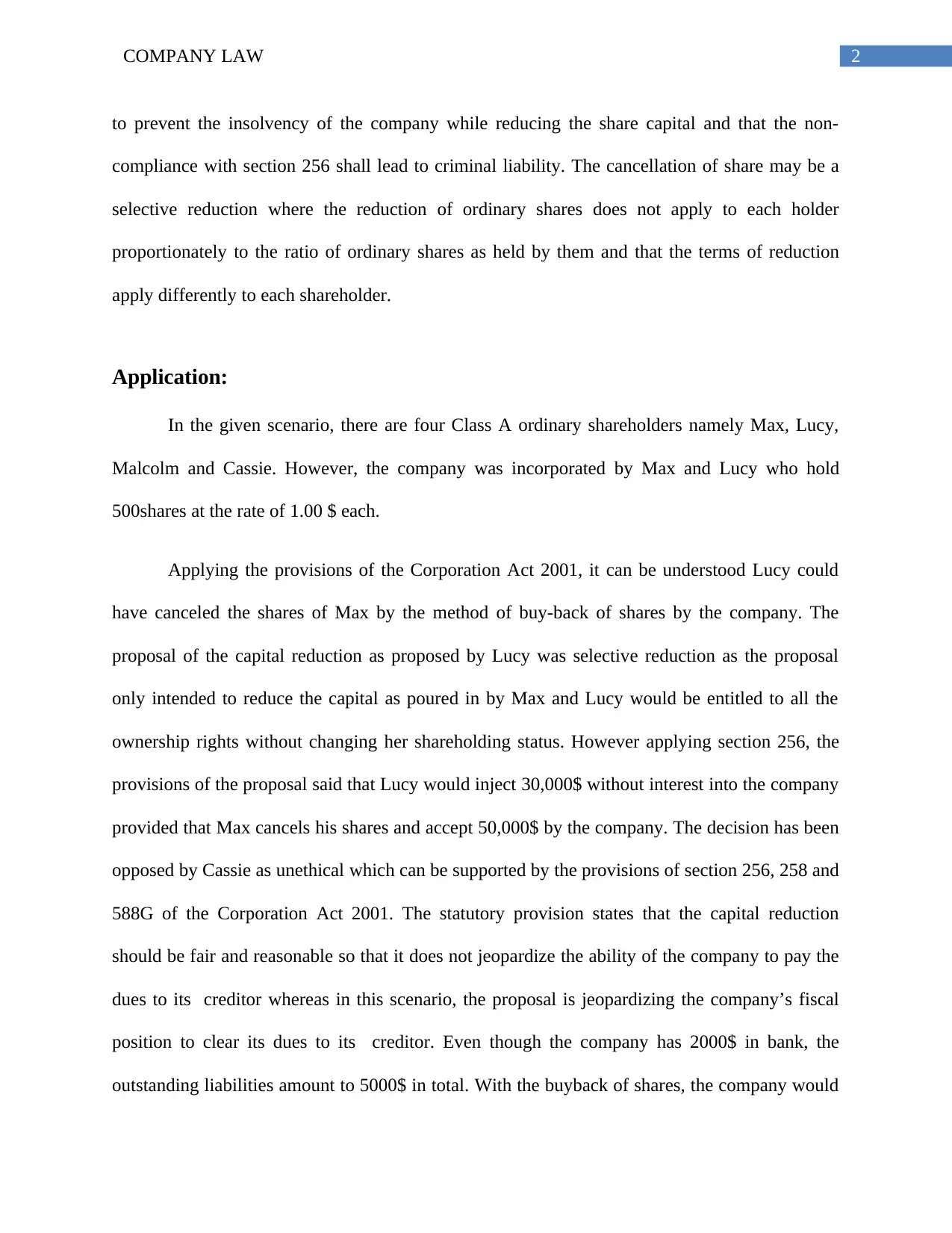
2COMPANY LAW
to prevent the insolvency of the company while reducing the share capital and that the non-
compliance with section 256 shall lead to criminal liability. The cancellation of share may be a
selective reduction where the reduction of ordinary shares does not apply to each holder
proportionately to the ratio of ordinary shares as held by them and that the terms of reduction
apply differently to each shareholder.
Application:
In the given scenario, there are four Class A ordinary shareholders namely Max, Lucy,
Malcolm and Cassie. However, the company was incorporated by Max and Lucy who hold
500shares at the rate of 1.00 $ each.
Applying the provisions of the Corporation Act 2001, it can be understood Lucy could
have canceled the shares of Max by the method of buy-back of shares by the company. The
proposal of the capital reduction as proposed by Lucy was selective reduction as the proposal
only intended to reduce the capital as poured in by Max and Lucy would be entitled to all the
ownership rights without changing her shareholding status. However applying section 256, the
provisions of the proposal said that Lucy would inject 30,000$ without interest into the company
provided that Max cancels his shares and accept 50,000$ by the company. The decision has been
opposed by Cassie as unethical which can be supported by the provisions of section 256, 258 and
588G of the Corporation Act 2001. The statutory provision states that the capital reduction
should be fair and reasonable so that it does not jeopardize the ability of the company to pay the
dues to its creditor whereas in this scenario, the proposal is jeopardizing the company’s fiscal
position to clear its dues to its creditor. Even though the company has 2000$ in bank, the
outstanding liabilities amount to 5000$ in total. With the buyback of shares, the company would
to prevent the insolvency of the company while reducing the share capital and that the non-
compliance with section 256 shall lead to criminal liability. The cancellation of share may be a
selective reduction where the reduction of ordinary shares does not apply to each holder
proportionately to the ratio of ordinary shares as held by them and that the terms of reduction
apply differently to each shareholder.
Application:
In the given scenario, there are four Class A ordinary shareholders namely Max, Lucy,
Malcolm and Cassie. However, the company was incorporated by Max and Lucy who hold
500shares at the rate of 1.00 $ each.
Applying the provisions of the Corporation Act 2001, it can be understood Lucy could
have canceled the shares of Max by the method of buy-back of shares by the company. The
proposal of the capital reduction as proposed by Lucy was selective reduction as the proposal
only intended to reduce the capital as poured in by Max and Lucy would be entitled to all the
ownership rights without changing her shareholding status. However applying section 256, the
provisions of the proposal said that Lucy would inject 30,000$ without interest into the company
provided that Max cancels his shares and accept 50,000$ by the company. The decision has been
opposed by Cassie as unethical which can be supported by the provisions of section 256, 258 and
588G of the Corporation Act 2001. The statutory provision states that the capital reduction
should be fair and reasonable so that it does not jeopardize the ability of the company to pay the
dues to its creditor whereas in this scenario, the proposal is jeopardizing the company’s fiscal
position to clear its dues to its creditor. Even though the company has 2000$ in bank, the
outstanding liabilities amount to 5000$ in total. With the buyback of shares, the company would
⊘ This is a preview!⊘
Do you want full access?
Subscribe today to unlock all pages.

Trusted by 1+ million students worldwide
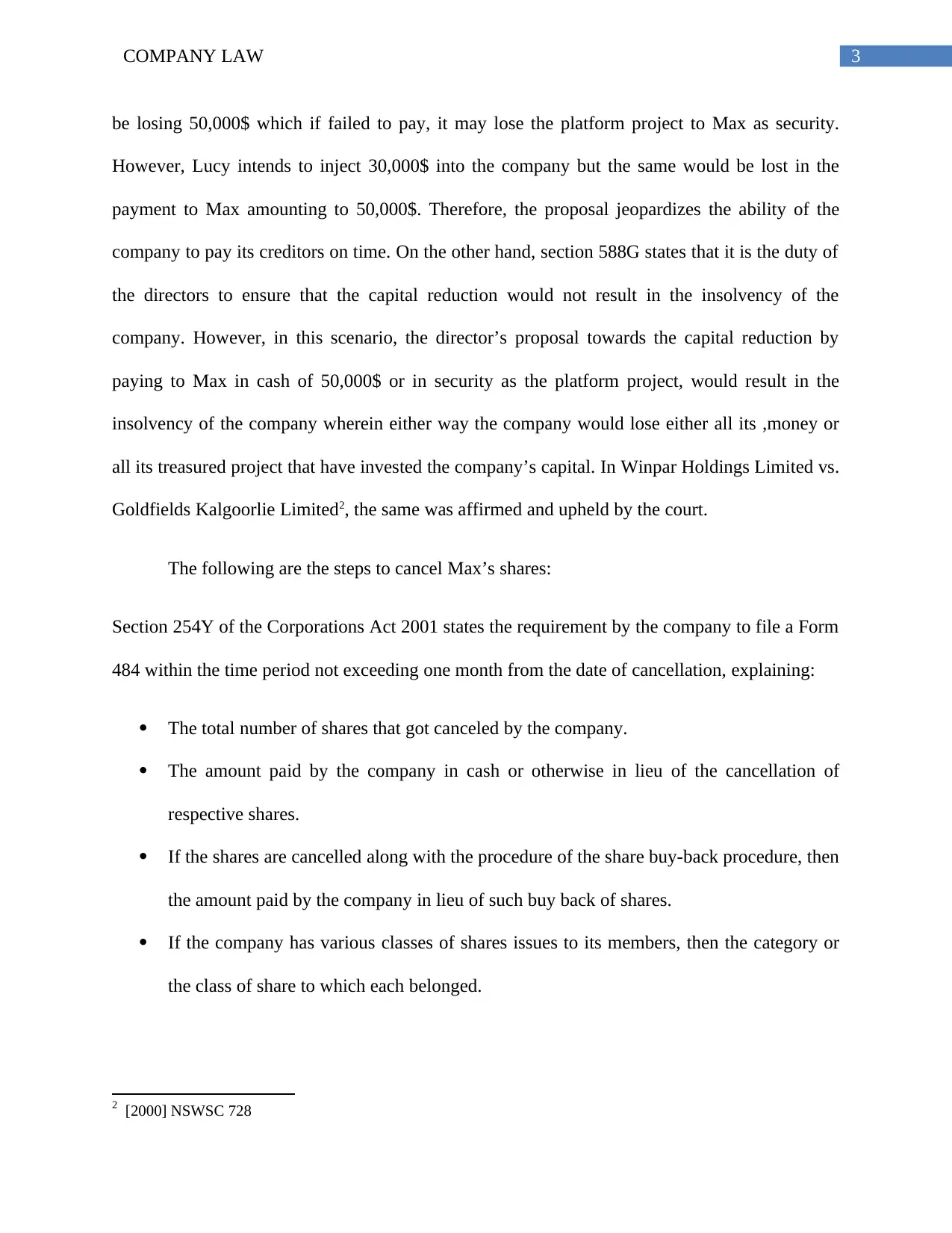
3COMPANY LAW
be losing 50,000$ which if failed to pay, it may lose the platform project to Max as security.
However, Lucy intends to inject 30,000$ into the company but the same would be lost in the
payment to Max amounting to 50,000$. Therefore, the proposal jeopardizes the ability of the
company to pay its creditors on time. On the other hand, section 588G states that it is the duty of
the directors to ensure that the capital reduction would not result in the insolvency of the
company. However, in this scenario, the director’s proposal towards the capital reduction by
paying to Max in cash of 50,000$ or in security as the platform project, would result in the
insolvency of the company wherein either way the company would lose either all its ,money or
all its treasured project that have invested the company’s capital. In Winpar Holdings Limited vs.
Goldfields Kalgoorlie Limited2, the same was affirmed and upheld by the court.
The following are the steps to cancel Max’s shares:
Section 254Y of the Corporations Act 2001 states the requirement by the company to file a Form
484 within the time period not exceeding one month from the date of cancellation, explaining:
The total number of shares that got canceled by the company.
The amount paid by the company in cash or otherwise in lieu of the cancellation of
respective shares.
If the shares are cancelled along with the procedure of the share buy-back procedure, then
the amount paid by the company in lieu of such buy back of shares.
If the company has various classes of shares issues to its members, then the category or
the class of share to which each belonged.
2 [2000] NSWSC 728
be losing 50,000$ which if failed to pay, it may lose the platform project to Max as security.
However, Lucy intends to inject 30,000$ into the company but the same would be lost in the
payment to Max amounting to 50,000$. Therefore, the proposal jeopardizes the ability of the
company to pay its creditors on time. On the other hand, section 588G states that it is the duty of
the directors to ensure that the capital reduction would not result in the insolvency of the
company. However, in this scenario, the director’s proposal towards the capital reduction by
paying to Max in cash of 50,000$ or in security as the platform project, would result in the
insolvency of the company wherein either way the company would lose either all its ,money or
all its treasured project that have invested the company’s capital. In Winpar Holdings Limited vs.
Goldfields Kalgoorlie Limited2, the same was affirmed and upheld by the court.
The following are the steps to cancel Max’s shares:
Section 254Y of the Corporations Act 2001 states the requirement by the company to file a Form
484 within the time period not exceeding one month from the date of cancellation, explaining:
The total number of shares that got canceled by the company.
The amount paid by the company in cash or otherwise in lieu of the cancellation of
respective shares.
If the shares are cancelled along with the procedure of the share buy-back procedure, then
the amount paid by the company in lieu of such buy back of shares.
If the company has various classes of shares issues to its members, then the category or
the class of share to which each belonged.
2 [2000] NSWSC 728
Paraphrase This Document
Need a fresh take? Get an instant paraphrase of this document with our AI Paraphraser
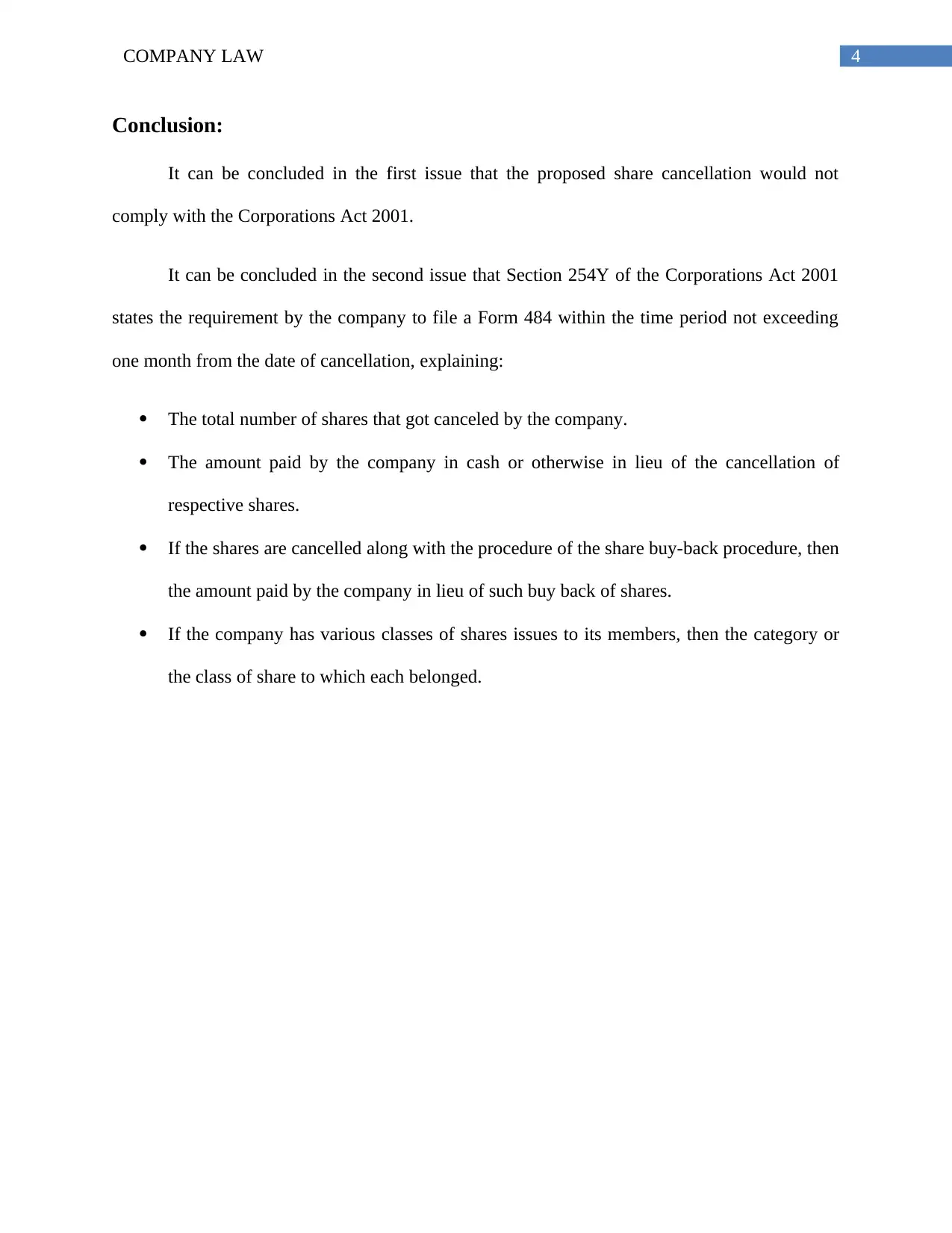
4COMPANY LAW
Conclusion:
It can be concluded in the first issue that the proposed share cancellation would not
comply with the Corporations Act 2001.
It can be concluded in the second issue that Section 254Y of the Corporations Act 2001
states the requirement by the company to file a Form 484 within the time period not exceeding
one month from the date of cancellation, explaining:
The total number of shares that got canceled by the company.
The amount paid by the company in cash or otherwise in lieu of the cancellation of
respective shares.
If the shares are cancelled along with the procedure of the share buy-back procedure, then
the amount paid by the company in lieu of such buy back of shares.
If the company has various classes of shares issues to its members, then the category or
the class of share to which each belonged.
Conclusion:
It can be concluded in the first issue that the proposed share cancellation would not
comply with the Corporations Act 2001.
It can be concluded in the second issue that Section 254Y of the Corporations Act 2001
states the requirement by the company to file a Form 484 within the time period not exceeding
one month from the date of cancellation, explaining:
The total number of shares that got canceled by the company.
The amount paid by the company in cash or otherwise in lieu of the cancellation of
respective shares.
If the shares are cancelled along with the procedure of the share buy-back procedure, then
the amount paid by the company in lieu of such buy back of shares.
If the company has various classes of shares issues to its members, then the category or
the class of share to which each belonged.
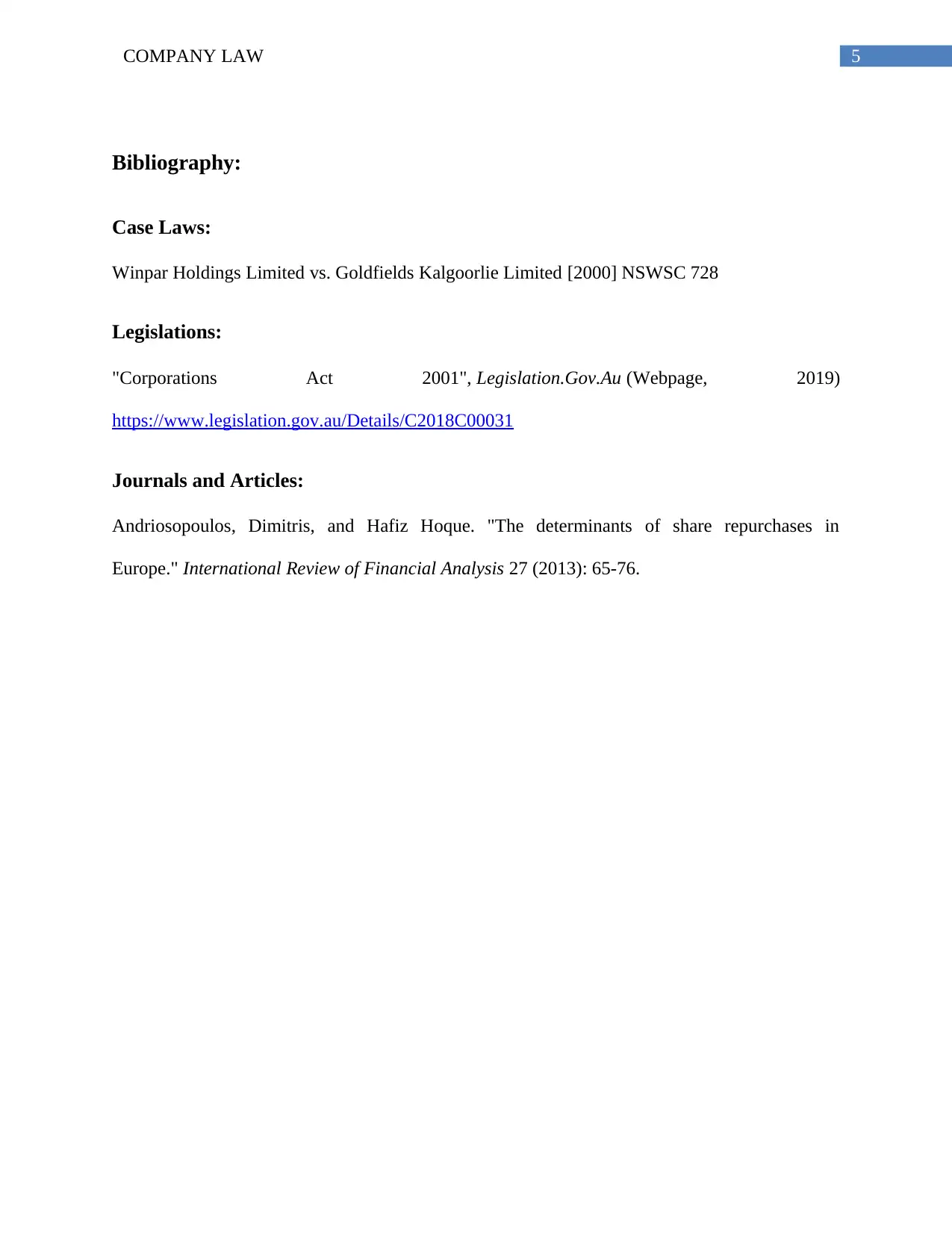
5COMPANY LAW
Bibliography:
Case Laws:
Winpar Holdings Limited vs. Goldfields Kalgoorlie Limited [2000] NSWSC 728
Legislations:
"Corporations Act 2001", Legislation.Gov.Au (Webpage, 2019)
https://www.legislation.gov.au/Details/C2018C00031
Journals and Articles:
Andriosopoulos, Dimitris, and Hafiz Hoque. "The determinants of share repurchases in
Europe." International Review of Financial Analysis 27 (2013): 65-76.
Bibliography:
Case Laws:
Winpar Holdings Limited vs. Goldfields Kalgoorlie Limited [2000] NSWSC 728
Legislations:
"Corporations Act 2001", Legislation.Gov.Au (Webpage, 2019)
https://www.legislation.gov.au/Details/C2018C00031
Journals and Articles:
Andriosopoulos, Dimitris, and Hafiz Hoque. "The determinants of share repurchases in
Europe." International Review of Financial Analysis 27 (2013): 65-76.
⊘ This is a preview!⊘
Do you want full access?
Subscribe today to unlock all pages.

Trusted by 1+ million students worldwide
1 out of 6
Related Documents
Your All-in-One AI-Powered Toolkit for Academic Success.
+13062052269
info@desklib.com
Available 24*7 on WhatsApp / Email
![[object Object]](/_next/static/media/star-bottom.7253800d.svg)
Unlock your academic potential
Copyright © 2020–2026 A2Z Services. All Rights Reserved. Developed and managed by ZUCOL.





